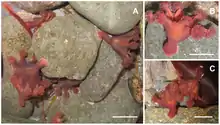Haliclystus
Haliclystus is a genus of stalked jellyfish that contains 11 species and one nomen nudum (Haliclystus sanjuanensis). It is the largest genus in the order Stauromedusae. Members of this genus are found in the Pacific, Atlantic, Indian, Arctic, and Southern oceans. Two members of this genus, Haliclystus kerguelensis and Haliclystus antarcticus, are found in the Southern hemisphere only. The remaining 9 members are found in the Northern hemisphere only.[1]
| Haliclystus | |
|---|---|
 | |
| Haliclystus antarcticus | |
| Scientific classification | |
| Domain: | Eukaryota |
| Kingdom: | Animalia |
| Phylum: | Cnidaria |
| Class: | Staurozoa |
| Order: | Stauromedusae |
| Family: | Haliclystidae |
| Genus: | Haliclystus James-Clark, 1863 |
| Species | |
| |
Species in this genus have four longitudinal planes of symmetry. They have eight arms which are tipped with clusters of secondary tentacles. The number of these secondary tentacles is reported to vary across the different species. Species in this genus also have eight large pads known as anchors located between the arms. These vary in size and shape and currently play in important role in differentiating one species from another. Some, but not all, species in this genus have prominent white nematocyst clusters.[1] The 'stalk' or peduncle in this genus is four chambered.[2]
At least one group of scientists have suggested that the taxonomy of this genus needs to be revised.[3]
References
- http://www.mapress.com/zootaxa/2010/f/zt02518p059.pdf
- A. G. Collins and M. Daly (2005). "A New Deepwater Species of Stauromedusae, Lucernaria janetae (Cnidaria, Staurozoa, Lucernariidae), and a Preliminary Investigation of Stauromedusan Phylogeny Based on Nuclear and Mitochondrial rDNA Data". The Biological Bulletin. 208 (3): 221–230. doi:10.2307/3593154. JSTOR 3593154. PMID 15965127. S2CID 1787470.
- Hirano YM (1997) A review of a supposedly circumboreal species of stauromedusa, Haliclystus auricula (Rathke, 1806). Proceedings of the 6th international conference on Coelenterate Biology, Leeuwenhorst, Nordwijkerhout, pp 247–252